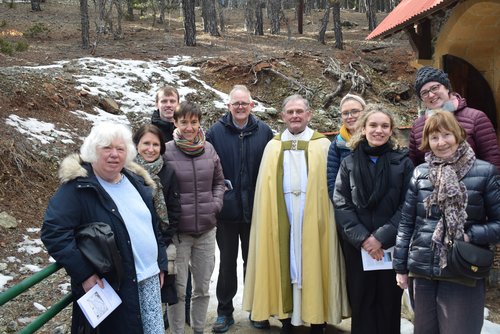An alternative vision
One of the consequences of the unrest in Israel/Palestine, Syria and Lebanon has been that the relatively peaceful and welcoming island of Cyprus has been rediscovered as a place of Christian interest. John Holdsworth reports on one such encounter.
Groups of pilgrims are making their way to Cyprus aided and abetted by tour companies desperate to find new itineraries. There is plenty here for them to see and experience. Cyprus is, of course, a Bible Land. Acts 13 describes how Paul and Barnabas made their way across the island from Salamis to Paphos but, beyond that, there is a wealth of Christian heritage to delight groups of visitors.
The Diocese of Europe is one of the most recent. The members of their Ministry Experience Scheme, a group consisting of people under the age of 30 who are trying to discern a vocation, recently made a pilgrimage here. It’s an annual event which normally visits Israel/Palestine.
They were attracted not only by the Bible link but by the exposure to Orthodox Christianity, how that operates as the established Church in the Republic of Cyprus, and what that means for church/state relations. The political division of the island following the events of 1974 gave opportunity for reflection about reconciliation, and dialogue between Christianity and Islam. The Anglican Church is a ‘guest’ in both jurisdictions, and that provided an additional interest.

The group visited the church where St Lazarus was (eventually) buried, as well as seeing the tomb of Barnabas. They visited some of the UNESCO-rated painted churches and were able to celebrate Eucharist at Agia Kyriaki church in Paphos, built on the site of a huge Christian Basilica and reckoned to be the site of Paul’s meeting with the Roman governor Sergius Paulus.
One thing the group’s leader, Dr Clare Amos, was very keen to do was to arrange a Eucharist to celebrate the Transfiguration at the highest Anglican church on the island – St George’s in the Forest – which stands around 6000’ above sea level in the Troodos mountains and is often unreachable because of snow. Although there had been recent snow, it proved possible to hold a freezing cold service there. Clare preached at that service and quoted Archbishop Michael Ramsey, “to be a theologian is to be exposed to the vision of heaven and the tragedies of mankind.” That is a great thought for those contemplating ordained or lay ministry, and a pretty astute summary of what any pilgrimage to the Middle East today might discover.